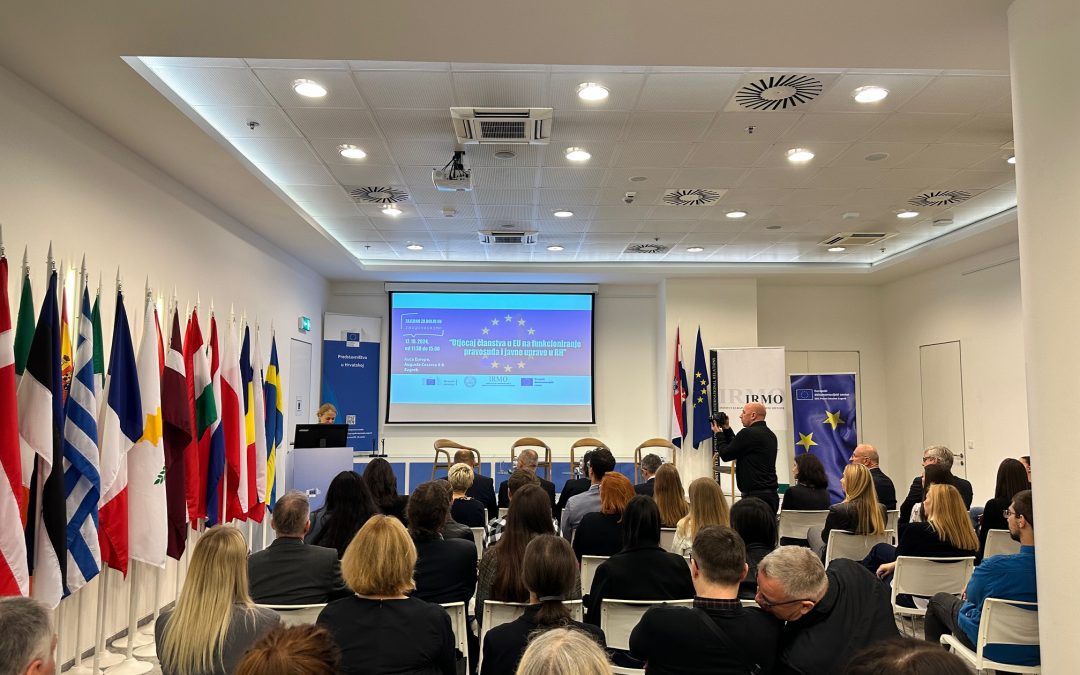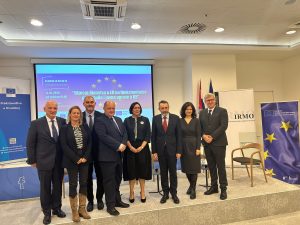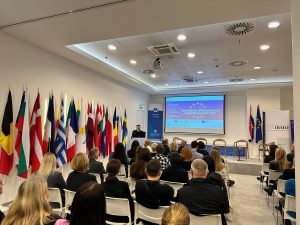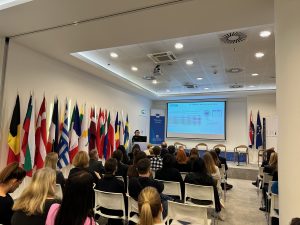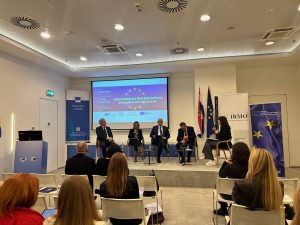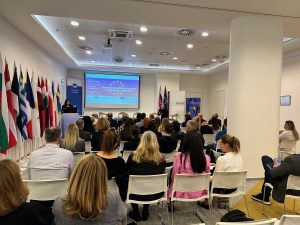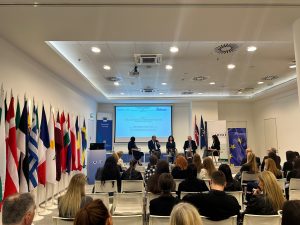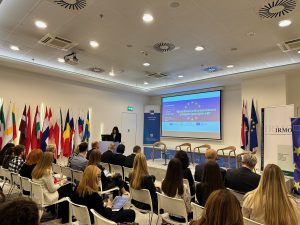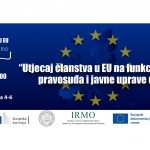Forum entitled “The impact of EU membership on the functioning of the judiciary and public administration in the Republic of Croatia” was held on October 17, 2024 in the premises of the European Commission Representation in the Republic of Croatia, Cesarčeva 4, in Zagreb.
After the welcoming remarks, the opening presentation was given by Prof. Ph.D. Tatjana Josipović from the Faculty of Law, University of Zagreb. Prof. Ph.D. Josipović stated that, according to the July 2024 Eurobarometer public opinion survey, 72% of respondents in Croatia believe that EU membership is important for the rule of law in the country. What is negative is the fact that only 23% of citizens in Croatia believe that the judiciary is independent, and as many as 69% of respondents believe that the situation in the judiciary is bad. Prof. Ph.D. Josipović also emphasized the importance of further depoliticization, i.e. strengthening the independence of the judiciary, and further digitization of the judiciary, where artificial intelligence (AI) tools and blockchain technology should be used. At the same time, the digitalization of land registers and cadastres should be highlighted as an example of good practice.
After the introductory presentation, the first panel entitled “The impact of EU membership on the functioning of the judiciary” was held, in which the following panelists participated: Asst. Prof. Kristian Turkalj, PhD, Croatian Catholic University in Zagreb, prof. Tatjana Josipović, PhD, Faculty of Law, University of Zagreb, prof. Elizabeta Ivičević Karas, PhD, Faculty of Law, University of Zagreb, and Božidar Horvat, mag. iur., County Court in Osijek. Asst. prof. Turkalj said that during and after Croatia’s accession to the EU, three phases can be noticed: in the first phase before the accession to the EU in 2013, a lot was done in the reform of the judiciary. However, in the second phase, since 2013, there has been a certain standstill, which can be seen in the example of amendments to the Law on Judicial Cooperation in Criminal Matters with EU Member States, the so-called Lex Perković, Turkalj pointed out. In the third phase, which started approximately in 2016 or 2017, there was a new impetus in the reform of the judiciary, especially due to functional funds from the EU that are used for the digitalization of the judiciary, Turkalj concluded. Prof. Josipović believes that Croatia has become a better society after 2013, but she added that the fragmentation of the legal system, i.e. the lack of consistency and coordination between ministries, is still a problem that Croatia needs to solve.
Prof. Ivičević Karas pointed out that after Croatia’s accession into the EU, much has been done in terms of fighting corruption, however, society’s perception is out of step with what has been done, especially due to the great media attention, especially in major corruption cases. Božidar Horvat reports that Croatia currently has 1,600 judges who deal with between 1,200,000 and 1,300,000 cases, and that during this year more cases were resolved than received. Accession to the EU represented a great stimulus, and significant resources from the EU funds were spent for the reform of the judiciary, from 2020 – annually, especially from the National Recovery and Resilience Plan (NPOO). Only 2% of cases older than ten years have been dealt with, and efforts are being made to reach a level of efficiency for resolving all cases within three years, Horvat added.
During the second panel entitled “The impact of EU membership on the process of public administration reform”, a discussion was held in which the following panelists participated: prof. Ivan Koprić, PhD, Dean, Faculty of Law, University of Zagreb; prof. Vedran Đulabić, PhD, Faculty of Law, University of Zagreb; prof. Anamarija Musa, PhD, Faculty of Law, University of Zagreb; and Zoran Pičuljan, PhD, President of the Board of the Foundation, Jadranko Crnic. Prof. Ph.D. Koprić pointed out that although there are about 300,000 employees working in the public administration, another eighty thousand employed in public utility companies in Croatia should be added to that figure. He emphasized that the citizens of the Republic of Croatia, like other citizens of the EU, have the right to good governance by the institutions, and one of its roles is the protection of human rights and freedoms and the rule of law. He pointed out that Croatia invested four billion euros in the reform of public administration. Prof. Koprić also mentioned the importance of the Directorate General for Structural Reform Support of the European Commission (DG REFORM), whose task is to encourage change in public administration in EU member states. Prof. Đulabić pointed out that a lot has been done in the reform of public administration, and an example of good public administration service to citizens is the e-citizens system. The problem, however, Đulabić believes, is that reforms are more or less exclusively technical in nature, and public sector reform should be approached strategically, as a change that will improve the standard of Croatian citizens, and not as a task assigned to Croatia by the EU. Prof. Musa said that Croatia needs a strategic approach to reforms that will cover all sectors and be the driving force behind public administration reforms. Mr. Pičuljan pointed out that raising the quality of public administration in Croatia requires first of all a strategic approach, then ensuring the quality and motivation of employees in public administration, and depoliticizing and professionalizing the public administration system.
This is the second panel in the series of meetings “Together for a better EU – let’s talk” organized by the European Documentation Center (EDC) of the Institute for Development and International Relations (IRMO), the European Documentation Center of the Faculty of Law in Zagreb and the European Documentation Center of the Faculty of Economics in Split. The panels were organized with the financial support of the European Commission.
Text written by:
Krševan Antun Dujmović, M.Sc.

